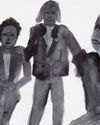
Over a Zoom video call one afternoon in November, Aisyah Aziz, the Malay singer-songwriter, speaks to me from within her home. What struck me instantly was her casual, confident disposition, perfectly set off by her head of bold, vivid yellow hair cropped into a pixie cut. In a loose, white T-shirt, she is snacking on a pack of roasted almonds. Her face, devoid of the graphic, daring makeup looks she often wears in public, is dominated by wide, round eyes, softly angular cheekbones and a pointy chin. Her speech is laden with Singaporean colloquialism and often ends in laughter, conveying a sense that the 26-year-old doesn’t take herself too seriously; one is instantly put at ease by her relaxed presence.
Another notable trait of Aisyah is how she likes to answer almost exclusively through anecdotes. She recounts instances to me as though she’s thinking out loud, her self-referential responses — “And I was like… And she was like…” — marked by a spontaneity in word choice and in her animated facial expressions.
This hyper-candidness might lull one to imagine that her career as a musician, which she embarked on at age 19, has been an easy course.
This story is from the December 2020 edition of T Singapore: The New York Times Style Magazine.
Start your 7-day Magzter GOLD free trial to access thousands of curated premium stories, and 9,000+ magazines and newspapers.
Already a subscriber ? Sign In
This story is from the December 2020 edition of T Singapore: The New York Times Style Magazine.
Start your 7-day Magzter GOLD free trial to access thousands of curated premium stories, and 9,000+ magazines and newspapers.
Already a subscriber? Sign In

Look At Us
As public memorials face a public reckoning, there’s still too little thought paid to how women are represented — as bodies and as selves.

Two New Jewellery Collections Find Their Inspiration In The Human Anatomy
Two new jewellery collections find their inspiration in the human anatomy.

She For She
We speak to three women in Singapore who are trying to improve the lives of women — and all other gender identities — through their work.
Over The Rainbow
How the bright colours and lively prints created by illustrator Donald Robertson brought the latest Weekend Max Mara Flutterflies capsule collection to life.

What Is Love?
The artist Hank Willis Thomas discusses his partnership with the Japanese fashion label Sacai and the idea of fashion in the context of the art world.

The Luxury Hotel For New Mums
Singapore’s first luxury confinement facility, Kai Suites, aims to provide much more than plush beds and 24-hour infant care: It wants to help mothers with their mental and emotional wellbeing as well.

Who Gets To Eat?
As recent food movements have focused on buying local or organic, a deeper and different conversation is happening among America’s food activists: one that demands not just better meals for everyone but a dismantling of the structures that have failed to nourish us all along.

Reimagining The Future Of Fashion
What do women want from their clothes and accessories, and does luxury still have a place in this post-pandemic era? The iconic designer Alber Elbaz thinks he has the answers with his new label, AZ Factory.

A Holiday At Home
Once seen as the less exciting alternative to an exotic destination holiday, the staycation takes on new importance.
All Dressed Up, Nowhere To Go
Chinese supermodel He Sui talks about the unseen pressures of being an international star, being a trailblazer for East Asian models in the fashion world, and why, at the end of the day, she is content with being known as just a regular girl from Wenzhou.